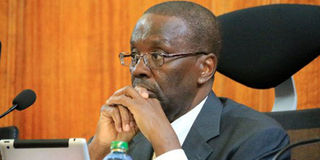It's dangerous when actions of judges fail test of moral high ground

Chief Justice Willy Mutunga follows proceedings of the case in which Deputy Chief Justice Kalpana Rawal and suspended Judge Philip Tunoi are challenging the retirement age for judges at the Supreme Court in Nairobi on June 2, 2016. The case begins on June 6, 2016. PHOTO | JEFF ANGOTE | NATION MEDIA GROUP
What you need to know:
- Frivolous behaviour is always unbecoming of a magistrate or judge.
When Chief Justice Willy Mutunga decided to leave one year earlier than his mandatory retirement age, he reasoned that his successor would be appointed well in advance of the August 2017 elections. For him, retiring in June 2017, only a few weeks to that General Election, would herald trouble for a new CJ in view of possible disputes arising from those elections. No one would have predicted that this reasonable act would unleash the worst in those others charged with national responsibilities that call for integrity, honour and grace.
To be a magistrate or judge is a calling to greater responsibility. It requires sacrifice. Otherwise, no one would take you seriously when you do base things common to ordinary mortals. Frivolous behaviour is always unbecoming of a magistrate or judge. To some extent, this is an unfair demand. But it is the deal judges assume when they sign across the dotted lines.
The dispute surrounding the retirement age of judges is a perfect example. It raises the question whether some of our judges understand the higher moral calling implied in their appointment. The case has now run its full course. The Court of Appeal has pronounced itself on it. The Supreme Court, it seems, may not pronounce itself on this issue due to incapacities within. There are enough conflict of interest issues that demand that individuals within the court accept the verdict of the Court of Appeal. Accepting this reality requires something higher than simple reference to laws. It is the only way the court can begin to mend the image people within are busy shredding. This image defines the higher moral calling of judges and exalts them in our eyes. The reason many of us Kenyans don’t enjoy similar honour is because the ethical demands on us are lower.
But rather than accept the verdict, shameful things have happened in the corridors of justice that make us wonder if our faith in the court is misplaced. It is always easier to say that there is political interference from outside the court. I have no evidence so far for this. In fact, such interference, though possible, is more difficult now given the independence the Judiciary has enjoyed under Dr Mutunga. There are many people who have things to complain about the current CJ, but like it happens everywhere else, we will rue the moments we missed to transform the Judiciary after he has left; it will perhaps be too late for us to appreciate how tough it was to keep the Judiciary independent.
In the meantime, a case can now be made that there are moral grounds for the CJ to rescind his decision to retire one year in advance of the mandatory retirement age. If it is, indeed, true as it has been alleged that a ruling of the Court of Appeal was stayed without the duty judge carefully studying its content, this suggests extra-legal motives driving such a decision. If it is also true that the hearing leading to the stay order did not include the lawyers representing the JSC, then someone within the court has reasons for acting this way that are not aimed at serving justice.
This also means that some lawyers have preferential treatment; that someone within the corridors of justice opened the door to some lawyers and slammed it on the JSC lawyers aiming, among other things, to bias the legal process and ensure a favoured verdict in this particular case. Can we ask which other cases have been similarly biased?
When the actions, processes and determinations of the highest court in the land do not stand up to the high standards judges are expected to uphold, the legitimacy of that institution comes under question. This is why it is important that this particular behaviour must be eradicated completely.
Godwin R. Murunga is a senior research fellow in the Institute for Development Studies, University of Nairobi.





